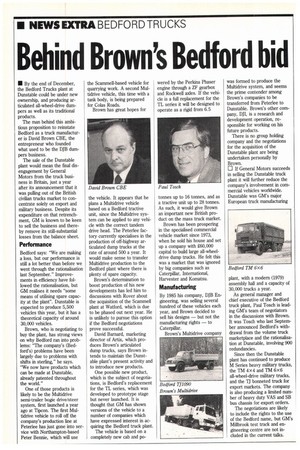Behind Brown's Bedford bid
Page 16

If you've noticed an error in this article please click here to report it so we can fix it.
• By the end of December, the Bedford Trucks plant at Dunstable could be under new ownership, and producing articulated all-wheel-drive dumpers as well as its traditional products.
The man behind this ambitious proposition to reinstate Bedford as a truck manufacturer is David Brown CBE, the entrepreneur who founded what used to be the DJB dumpers business.
The sale of the Dunstable plant would mean the final disengagement by General Motors from the truck business in Britain, just a year after its announcement that it was pulling out of the British civilian trucks market to concentrate solely on export and military business. Despite its expenditure on that retrenchment, GM is known to be keen to sell the business and thereby remove its still-substantial losses from the balance sheet.
Performance
Bedford says: "We are making a loss, but our performance is still a lot better than before we went through the rationalisation last September." Improvements in efficiency have followed the rationalisation, but GM realises it needs "some means of utilising spare capacity at the plant". Dunstable is expected to produce 5,500 vehicles this year, but it has a theoretical capacity of around 30,000 vehicles.
Brown, who is negotiating to buy the plant, has strong views on why Bedford ran into problems: "The company's (Bedford's) problems have been largely due to problems with shifts in sterling," he says. "We now have products which can be made at Dunstable, already patented throughout the world."
One of those products is likely to be the Multidrive semi-trailer bogie drive/steer system, first launched a year ago at Tipcon. The first Multidrive vehicle to roll off the company's production line at Peterlee has just gone into service with Northampton-based Peter Bennie, which will use the Scammell-based vehicle for quarrying work. A second Multidrive vehicle, this time with a tank body, is being prepared for Colas Roads.
Brown has great hopes for the vehicle. It appears that he plans a Multidrive vehicle based on a Bedford tractive unit, since the Multidrive system can be applied to any vehicle with the correct tandem drive head. The Peterlee factory currently specialises in the production of off-highway articulated dump trucks at the rate of around 500 a year. It would make sense to transfer Multidrive production to the Bedford plant where there is plenty of spare capacity.
Brown's determination to boost production of his new developments has led him to discussions with Rover about the acquisition of the Scammell plant at Watford, which is due to be phased out next year. He is unlikely to pursue this option if the Bedford negotiations prove successful.
David Barnard, marketing director of Artix, which produces Brown's articulated dump trucks, says Brown intends to maintain the Dunstable plant's present activity and to introduce new products.
One possible new product, which is the subject of negotiations, is Bedford's replacement for the TL series, which was developed to prototype stage but never launched. It is thought that GM has shown versions of the vehicle to a number of companies which have expressed interest in acquiring the Bedford truck plant.
The vehicle is based on a completely new cab and po wered by the Perkins Phaser engine through a ZF gearbox and Rockwell axles. If the vehicle is a full replacement for the TL series it will be designed to operate as a rigid from 6.5 tonnes up to 16 tonnes, and as a tractive unit up to 28 tonnes. As such, it would give Brown an important new British product on the mass truck market.
Brown has been prospering in the specialised commercial vehicle market since 1973, when he sold his house and set up a company with £60,000 capital to build large all-wheeldrive dump trucks. He felt this was a market that was ignored by big companies such as Caterpillar, International, Harvester and Komatsu.
Manufacturing
By 1985 his company, DJB Engineering, was selling several hundred of these vehicles each year, and Brown decided to sell his designs — but not the manufacturing rights — to Caterpillar.
Brown's Multidrive company was formed to produce the Multidrive system, and seems the prime contender among Brown's companies to be transferred from Peterlee to Dunstable. Brown's other company, DP, is a research and development operation, responsible for working on his future products.
There is no group holding company and the negotiations for the acquisition of the Dunstable plant are being undertaken personally by Brown.
LI If General Motors succeeds in selling the Dunstable truck plant it will further reduce the company's involvement in commercial vehicles worldwide. Dunstable was GM's major European truck manufacturing
plant, with a modern (1979) assembly hall and a capacity of 30,000 trucks a year.
As general manager and chief executive of the Bedford truck plant, Paul Tosch is leading GM's team of negotiators in the discussions with Brown. It was Tosch who last September announced Bedford's withdrawal from the volume truck marketplace and the rationalisation at Dunstable, involving 900 redundancies.
Since then the Dunstable plant has continued to produce M Series heavy military trucks, the TM 4x4 and TM 6x6 all-wheel-drive military trucks, and the Ti bonneted truck for export markets. The company is also producing a limited number of heavy duty VAS and SB bus chassis for export orders.
The negotiations are likely to include the rights to the use of the Bedford name, but GM's Millbrook test track and engineering centre are not included in the current talks.




































































































































